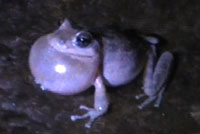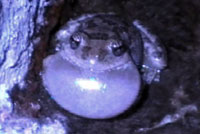
A Guide to California's
Reptiles and Amphibians
Sounds of
California Treefrog (or Chorus Frog) - Pseudacris cadaverina
(Cope, 1866)
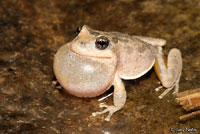
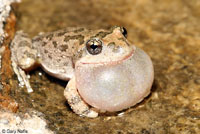
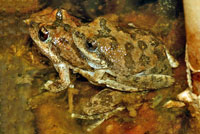
|
Male frogs and toads sometimes make a variety of sounds. These calls can have different functions. Advertisement Calls The advertisement call is the most well-known call of a frog or toad. It is made by a male during the breeding season to establish his territory and repel rival males and to attract females as potential mates. Males usually make the call in or near bodies of water near areas that are attractive to a female as a good place to lay her eggs. Advertisement calls can be heard during the evening and at night, and often during daylight at the peak of the breeding season. Sometimes an advertisement call will be heard outside of the breeding season and away from water. The reason for this is not understood. Each species has its own unique advertisement call. This is necessary to differentiate them when there is more than one species calling. The evolution of this specific male advertisement call and its recognition by females is considered to be an important isolating mechanism in the evolution of a species. The advertisement call of the California Treefrog is a loud quick low-pitched duck-like quacking that ends abruptly and is given repeatedly. Males call at night. Warning Call Male California Treefrogs also produce a trilled warning call (or encounter call) when interacting closely with other males of the species. (Davidson) |
|||||||
The following five calls were all recorded at night at close range around a small artificial desert pond (shown below) situated at the mouth of a large rocky riparian canyon in San Diego County. Male frogs were calling while floating on the water, hiding in reeds, and out in the open. |
|||||||
| This is a 2 second recording of two advertisement calls of a single frog. | |||||||
| This is a 5 second recording of the advertisement calls of a few frogs, including some rasping warning or encounter calls. | |||||||
| This is an 8 second recording of a small group of frogs, including warning calls at the end. |
|||||||
| This is a 12 second recording of the advertisement calls of a small group of frogs, including warning calls at the end. | |||||||
| This is a 12 second recording of the advertisement calls of a small group of frogs, including warning calls. A California Toad can be heard in the background at the very end. | |||||||
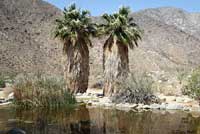 |
|||||||
| This is a 14 second recording of distant advertisement calls of California Treefrogs and Baja California Treefrogs - Pseudacris hypochondriaca, at night in a riparian canyon in San Diego County (shown below.) | |||||||
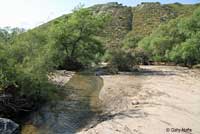 |
|||||||
| Waveform and Sonogram | |||||||
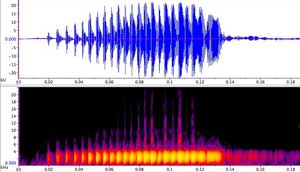 |
|||||||
| This is a recording of one repetition of the advertisement call of a California Trefrog recorded at night in San Diego County. The image above is a visual representation of this call. Click on it to see a larger image. Click here for information about how to read the waveform and sonogram images. |
|||||||
| Short Videos | |||||||
|
|||||||
You can listen to more recordings of California Treefrogs on this cd: Carlos Davidson - Frog and Toad Calls of the Pacific Coast 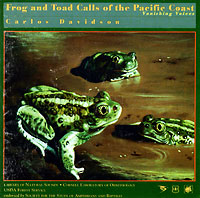 and on the cd that comes with this book: Lang Elliott, Carl Gerhardt, and Carlos Davidson - The Frogs and Toads of North America - Houghton Mifflin Harcourt. 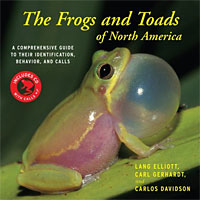 |
|||||||
Return to the Top
© 2000 -
